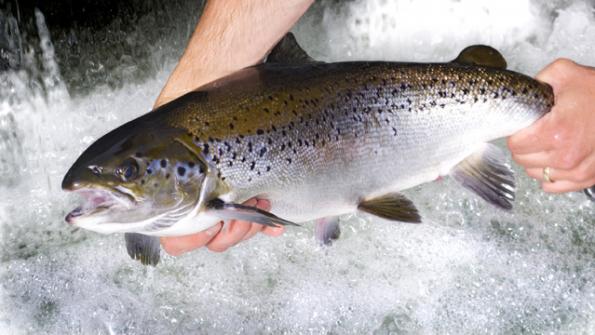April 13, 2012

A new draft biological opinion issued by the National Marine Fisheries Service has found that three commonly used herbicides are increasing the chance of extinction for threatened and endangered Pacific salmon and steelhead runs.
The assessment by the federal fisheries service reverses earlier assurances from the U.S. Environmental Protection Agency that the three poisons were "not likely to adversely affect" these dwindling salmon populations.
The biological opinion prescribes measures to keep oryzalin, pendamethalin, and trifluralin out of salmon waters in Washington, Oregon, California, and Idaho. It is the fifth such plan issued under a court settlement with fishermen and conservationists.
The new protections, which must be implemented within one year of a final Biological Opinion, include:
• Prohibiting aerial applications of the pesticides within 300 feet of salmon waters.
• Mandating a 10 foot vegetated strip or a 20-foot no spray zone between salmon waters and places where these herbicides are applied.
• Mandatory reporting of fish kills near where these chemicals were applied.
"This is a huge step forward for the health of our rivers," said Aimee Code Environmental Health Associate at the Northwest Center for Alternatives to Pesticides. "These findings are a reminder that chemical pest control comes at a high cost. The true solution is to expand the use of non-chemical solutions."
The 780 page assessment concluded that if these pesticides are used as currently authorized, they are "likely to jeopardize the continued existence" of threatened and endangered salmon and steelhead populations.
"The federal government has just acknowledged that these three chemicals are washing off into our rivers and streams and harming west coast salmon runs and who knows what else," said Steve Mashuda, of Earthjustice. "It is time for the government to stand up to pesticide industry and impose these much needed restrictions," he concluded.
Fishermen are pleased by the proposed measures designed to help restore struggling salmon runs. "These pesticides are poisons and do not belong in salmon streams," commented Glen Spain of the Pacific Coast Federation of Fishermen's Associations (PCFFA), a commercial fishing industry group.
"The bottom line of us is that poisoning salmon rivers puts our people out of work as well as creates a public health hazard. It is far more cost effective to keep these poisons out of our rivers to begin with than to try to clean up messes afterwards."
The three active ingredients are registered for uses both in agriculture and in urban areas. All three can be used in lawns and landscaping. Each herbicide is registered for weed control in a variety of crops. Some of the crops listed where these chemicals can be used include Christmas trees, vineyards, onions, potatoes, and dry beans.
They are also all registered for use along rights-of-way. This latest assessment was completed as part of an ongoing effort to address the harms from numerous pesticides. It was preceded by several years of legal wrangling by the Northwest Center for Alternatives to Pesticides, Pacific Coast Federation of Fishermen's Associations, with representation from Earthjustice.
This effort began in January 2001, when some of the groups first went to court to force EPA to protect salmon in the Pacific Northwest from 54 pesticides that EPA approved for use without checking with federal fish biologists, as required by the Endangered Species Act. As a result of that lawsuit, a federal court ordered EPA to consult with federal fish biologists at NMFS on the impacts these pesticides have on salmon and steelhead in the Pacific Northwest and California.
In 2007, NMFS settled a second lawsuit and agreed to complete the long overdue assessments over a four-year period.
You May Also Like




